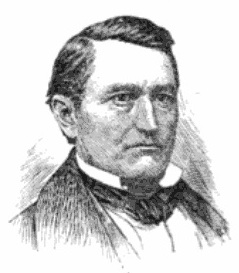Junius Hillyer to Howell Cobb.
Washington [D. C],
Monday, Feb. 11th [1861].
Dear Sir: Before I close my official term I will use one more frank to you, and that will end a very convenient privilege which I was never fully satisfied ought to have been allowed me.
There is I think a growing tendency here to a peaceble acquiescence in our revolution. My opinion is that the Republicans are as much afraid of us as we are of them, and they are daily becoming more and more impressed with the idea of our resources and strength. And my opinion now is that if you can avoid a collision, assume towards old Lincoln an attitude of respectful determination, that we can so manage him as to get along till Congress meets, when they will repeal all federal laws so far as they affect the seceding States. This will answer our purpose for the present. And the day is not distant when we may reasonably hope for the establishment of friendly relations with the present Government of the U. S. This will of course depend upon the temper of Lincoln and his cabinet. We must hope for the best.
I had a long talk today with J. B. Guthrie and I am of opinion that he would be glad to take a place in our treasury department. I am sure of it. We will want some experience etc. in organizing our revenue system. You and Tom and Stephens and Toombs and the rest must not fail to provide a place in the law or judicial department of the Government for me. I look forward to the future with a fear of starvation. I tell you that under the present pressure my income is destroyed and is just nothing. Talk to our delegation and get them to unite in providing some employment for me. There must be a solicitor of the treasury or some place corresponding to it. And for that I am better qualified than any other living man.
I am gratified beyond measure to see that you are moving forward with a strength and power that commands the respect of all parties here. The Black Republicans are absolutely confounded, and Hunter is in extacies. But there is a dark cloud which gives me trouble. You don’t attach the same importance to it that I do. I do greatly fear that this Union sentiment in the Border States means submission. My fear is that they are influenced by an indifference to slavery and that the anti-slavery tide is rolling further South. So that I am more and more earnest every day that they should be conciliated and drawn to us by the most friendly legislation as to their interests. From what I hear about the collector at N. Orleans I am very uneasy that mortal offence will be given to the states north of Louisiana. The conduct of the collector may not be understood.
From Annual Report of the American Historical Association for the Year 1911.
Junius Hillyer (April 23, 1807 – June 21, 1886) was an American lawyer, judge, and politician who served two terms in the United States Congress. After his congressional career, Hillyer was appointed by President James Buchanan as Solicitor of the United States Treasury, and served from 1857 until February 13, 1861 when, as a result of Georgia’s seccession from the Union, he resigned his post and returned to Georgia. This marked the end of Hillyer’s career in public service. For his remaining years he concentrated on the private law practice.
Howell Cobb was an American political figure. A southern Democrat, Cobb was a five-term member of the United States House of Representatives and Speaker of the House from 1849 to 1851. He also served as the 40th Governor of Georgia and as a Secretary of the Treasury under President James Buchanan. Cobb is, however, probably best known as one of the founders of the Confederacy, having served as the President of the Provisional Congress of the Confederate States.
